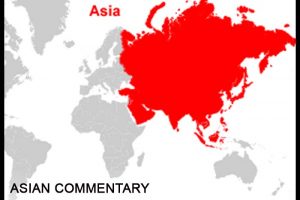Asian Markets Sharply Lower Amid War Hysteria

Asian stock markets are trading sharply lower on Tuesday, despite a lack of cues from Wall Street overnight due to a holiday, as rising geopolitical tensions between Russia and Ukraine triggered a sell-off in global equities. Investors watched the latest developments in Ukraine as last-ditch diplomatic efforts continued to prevent what Western powers warn could be the imminent Russian invasion of Ukraine.
Asian stocks ended mostly lower on Monday.
The news of a summit between U.S. President Joe Biden and Russian counterpart Vladimir Putin fueled some hopes for a diplomatic solution to the Ukraine conflict. U.S. officials said that the proposed summit would happen only if Russia did not attack Ukraine.
Russia has extended military drills in Belarus, citing an increase in tensions along the Ukraine border.
However, Moscow continues to deny it plans to invade Ukraine and says it is already pulling troops back from areas near the border.
The Australian stock market is trading significantly lower on Tuesday, giving up the gains in the previous session, with the benchmark S&P/ASX 200 falling below the 7,200 mark, following the lack of cues from Wall Street overnight, with weakness in materials and technology stocks partially offset by gains in gold miners and energy stocks as rising geopolitical tension between Russia and Ukraine is weighing on market sentiment.
Meanwhile, concerns over the domestic COVID-19 cases have softened as the daily new cases are on a steady decline, despite some spikes intermittently.
The benchmark S&P/ASX 200 Index is losing 108.40 points or 1.50 percent to 7,125.20, after hitting a low of 7,123.00 earlier. The broader All Ordinaries Index is down 119.70 points or 1.60 percent to 7,387.30. Australian stocks closed slightly higher on Monday.
Among the major miners, Rio Tinto, BHP Group and Fortescue Metals are losing almost 1 percent each, while Mineral Resources is declining more than 1 percent and OZ Minerals is slipping more than 4 percent.
Oil stocks are higher. Woodside Petroleum and Beach energy are advancing more than 2 percent each, while Santos is adding almost 2 percent and Origin Energy is gaining almost 1 percent.
Among the big four banks, Westpac and ANZ Banking are losing almost 1 percent each, while Commonwealth Bank and National Australia Bank are declining almost 2 percent each.
Among tech stocks, Zip is plunging more than 7 percent, Xero is losing almost 4 percent, Block sliding more than 6 percent, Appen is declining more than 2 percent and WiseTech Global is slipping more than 5 percent.
Gold miners are mostly higher. Evolution Mining is gaining more than 2 percent, Northern Star Resources is advancing more than 4 percent, Gold Road Resources is up more than 1 percent and Newcrest Mining is adding almost 2 percent, while Resolute Mining is losing almost 3 percent.
In other news, shares in Coles are gaining almost 4 percent after the supermarket giant posted a better-than-expected first-half profit, with sales for the period rising slightly. Coles also declared an interim dividend.
Shares in Cochlear are surging more than 8 percent after the medtech declared an higher interim dividend, while reporting a 12 percent increase in constant currency revenues, but statutory net profit dropped 30 percent. It confirmed its full-year underlying profit guidance.
In the currency market, the Aussie dollar is trading at $0.719 on Tuesday.
The Japanese stock market is sharply lower on Tuesday, extending the losses in the previous three sessions, with the benchmark Nikkei index falling below the 26,400 level, following the lack of cues from Wall Street overnight, with traders remaining cautious and continuing to track the rising geopolitical tension between Russia and Ukraine.
Traders also remain concerned about the domestic coronavirus cases, though the daily new cases are off their record highs.
The benchmark Nikkei 225 Index closed the morning session at 26,327.90, down 582.97 points or 2.17 percent, after hitting a low of 26,305.28 earlier. Japanese shares closed significantly lower on Monday.
Market heavyweight SoftBank Group is losing more than 1 percent and Uniqlo operator Fast Retailing is declining almost 3 percent. Among automakers, Honda and Toyota are losing almost 2 percent each.
In the tech space, Advantest and Screen Holdings are losing more than 5 percent each, while Tokyo Electron is down almost 4 percent. In the banking sector, Mitsubishi UFJ Financial, Mizuho Financial and Sumitomo Mitsui Financial are losing more than 1 percent each.
The major exporters are lower. Panasonic is losing almost 2 percent, Mitsubishi Electric is down more than 1 percent, Canon is slipping almost 4 percent and Sony is down more than 2 percent.
Among the other major losers, Sharp is plunging almost 8 percent, while Kawasaki Kisen Kaisha, Sumco and Kikkoman are slipping more than 5 percent each. Nippon Express Holdings and Yokohama Rubber are losing almost 5 percent, while Alps Alpine, AGC, Mitsubishi Motors, Isuzu Motors, Mazda Motor and Nissan Motor are siding more than 4 percent each.
Conversely, Daiichi Sankyo is soaring more than 10 percent.
In the currency market, the U.S. dollar is trading in the higher 114 yen-range on Tuesday.
Elsewhere in Asia, Hong Kong is plummeting 3.1 percent, South Korea is plunging 1.8 percent, Taiwan is losing 1.7 percent and China is down 1.0 percent, while New Zealand, Singapore, Malaysia and Indonesia are lower by between 0.2 and 0.7 percent each.
On Wall Street, the markets were off on Monday for the President’s Day holiday and will return to action on Tuesday.
The major European markets were mixed in cautious trade on the day The German DAX was up 0.1 percent and the U.K.’s FTSE 100 edged up 0.2 percent, while France’s CAC 40 index slipped 0.3 percent.
Crude oil prices were subdued on Monday as global leaders push for a diplomatic solution to Russia-Ukraine crisis. West Texas Intermediate Crude oil futures for March ended lower by 0.3 percent at $89.98 a barrel.
Source: Read Full Article
